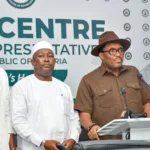Nasarawa rice farmers laud Sasakawa’s climate-smart technologies for bumper harvest
By Sunday John
No fewer than 5,119 rice farmers in Nasarawa have benefited from climate-smart technologies and training in good agronomic practices introduced by Sasakawa Africa Association (SAA), an NGO, with great impact on yield in the state.
Some of the farmers who spoke during the 2025 Mega Field Day visit to Assakio and Yalwata Wuji Communities in Lafia Local Government Area by the SAA team and other partners, said the intervention had greatly impacted their rice yield and livelihood.
Mr Abdullahi Ibrahim and Dauda Agum, both rice farmers in Yalwata Wuji, said that they were taught how to prepare nursery beds and transplant rice in rolls as against the usual broadcast method.
Ibrahim said, “This new method has helped to reduce seed wastage and improve yield in my farm.
“Where I usually use up to a basin of rice seed to broadcast, I now use about 16 kilograms of rice seed to plant, and I get more than double the harvest I got using the broadcast method.”
Agum also corroborated Ibrahim’s assertion, saying, “I am over 60 years old and have been farming all my life, but Sasakawa’s intervention in the technology and training has made me realize how much I have been suffering.
“I used to get about 18 bags of rice from one hectare, but now I get over 30 bags using the new method of planting rice and deep soil application of fertilizer.”
Mr Abdullahi Yusuf, another farmer in Assakio Community said that he had become the envy of other rice farmers given the bumper yield from the adoption of the technology and good agronomic practices.
“I now sell seeds to other farmers, introduce them to the new technology, and teach them how to apply same in their farms,” he said.
Alh. Idris Garko, Facilitator of the project being implemented by SAA in Nasarawa, explained that it was funded by Japan Government’s Policy and Human Resource Development Grant (PHRDG) through the African Development Bank.
According to Garko, the project aims to mitigate the effects of climate change and promote regenerative agricultural practices to increase food and nutrition, agricultural productivity, and household incomes.
He noted that the three-year project being implemented in Lafia, Doma, and Akwanga Local Government Areas had so far directly reached 5,119 farmers in the state with more than 100,000 other farmers targeted to benefit indirectly.
Garko explained that the farmers were trained on climate-smart technologies such as the production of biochar, a compost made from partially burning rice husk, that helps to improve the soil texture and its water retention capacity.
“The farmers were also introduced to the use of Urea Super Granules (USG) fertilizers, as well as trained on modern agronomic practices.
“They were also given inputs such as improved rice seeds, fertilizers (USG), insecticides, herbicides, and biochar to enable them to carry out farming activities during the rainy and dry seasons,” he said.
He noted that the issue of climate change with its attendant global warming had become a major challenge mostly as a result of human activities that deplete the ozone layer, hence the need for farmers to adopt climate-smart practices.
“We know that when farmers broadcast fertilisers, there are volatile elements called nitrates that escape into the atmosphere, which also affects the ozone layer.
“We, therefore, introduced to the farmers the USG fertiliser, which they had to bury in the soil, and it dissolves gradually to the root of the plant where it’s needed,” he said.
Garko commended the farmers for adhering to the teachings, which he noted had helped them to improve their yields.
In his remarks, Mr Godwin Atser, the Country Director of SAA, represented by Dr Bello Shehu, the Technical Coordinator of Regenerative Agriculture of the NGO, Dr Bello Shehu, said that the intervention was yielding the desired results in the state.
He promised that the organisation would continue to support the farmers to improve their livelihoods and encouraged them to cascade the training to other farmers in their communities.
Earlier, Mrs Salome Sabo, State Coordinator, SAA appreciated the farmers and other partners for gracing the field visit.
Sabo reiterated the organisation’s continuous commitment to supporting farmers to increase their yield.
The News Agency of Nigeria (NAN) reports that other partners who were part of the field visit included Dr Razack Adeoti, representing Technologies for Africa Agricultural Transformation (TAAT) from the Republic of Benin.
Others are Mr Oyelude Joseph, a Research Technician from the International Institute of Tropical Agriculture, as well as Umar Nuhu from Nasarawa Agricultural Development Programme (NADP), amongst others. (NAN)
Edited by Isaac Ukpoju
Published By
Has also recently published
 PoliticsJuly 3, 2025Reps advance bill to ensure free access to internet in public places
PoliticsJuly 3, 2025Reps advance bill to ensure free access to internet in public places HealthJuly 3, 2025States showcase innovative financing models for family planning services in Nigeria
HealthJuly 3, 2025States showcase innovative financing models for family planning services in Nigeria PoliticsJuly 3, 2025Reps to hold national summit on nutrition, food security July 10
PoliticsJuly 3, 2025Reps to hold national summit on nutrition, food security July 10 Science & TechJuly 3, 2025Shun cybercrime, use skills more productively, security officials advise Nigerian youths
Science & TechJuly 3, 2025Shun cybercrime, use skills more productively, security officials advise Nigerian youths





